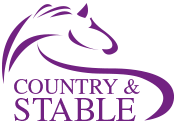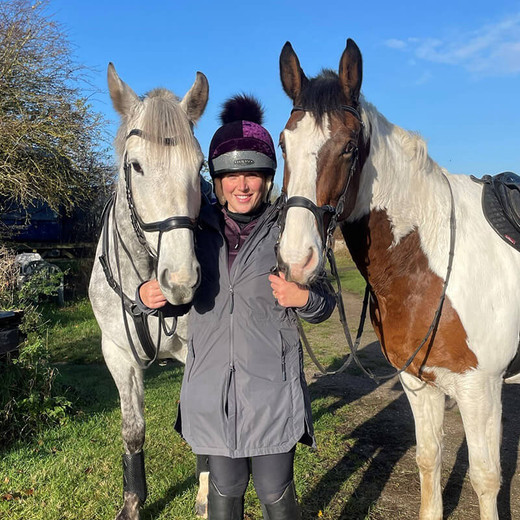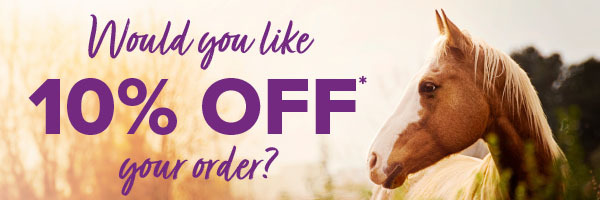Tips for buying a horse
Feb 16th 2022
Looking to buy a horse? Read some top tips on buying a horse.
Most of you may be aware our Brand Ambassador Jess Maye recently went on the hunt for a new horse. She has taken the time to tell us all about her experience of the dos and don’ts for making the monumental life decision of purchasing a horse. Read her guest blog on all her tips and hints which may help in your process.
If you are thinking about taking the plunge, let this blog guide you through the challenge of purchasing a horse, I am of course speaking from experience. Let me help you, with the questions to ask, what to do, or even where to start!
Looking for the perfect horse is immensely time consuming so before you’re even out the start box you need to consider your wish list. What is your dream type of horse? Write down what you want, then consider what you are willing to comprise on. Do not be tempted to add things on, I repeat, stick to the list! Once you have an idea of what your unicorn will be like, put your big girl pants on, think clearly and consider the following.
Do you have the time?
Do you have the time to feed, muck out, turn out, etc, on a daily basis? If time might be an issue, then it could be worth looking into a share to see if it’s for you, or a part/full time livery to reduce the work you’d have to undertake yourself.
Do you have the money?
If you’re considering buying a horse, then we’d guess you have the money to do so. Horse prices have increased significantly through the pandemic, long gone are the days of finding a bargain. There is a shortage of good quality horses coupled with the increase cost to import due to Brexit, you now need a fair bit of Wonga to get a sane and sensible steed. On top of the initial cost of purchase have you considered how much you’ll need to pay for the following:
- Livery - unless you’re keeping it at home, you’ll need somewhere for your horse to live, which will cost money.
- Vets bills - your horse will need injections and worming throughout the year, as well as any other unforeseen treatments. Insurance is, of course, recommended to cover these expenses, but you’ll need to pay for that as well.
- Farrier - your horse will require farrier work (work on its hooves) roughly every six-eight weeks.
- Lessons - Unless you’re a competent rider already, you’ll need lessons. Also, to help further both your horse’s and your educations lessons are always recommended.
- Feed - horses gotta eat
- Bedding
- Tack & equipment - you need to ensure your horse has the appropriate equipment, whether it’s a stable rug for colder weather or a fly sheet to keep the bugs at bay. You’ll also need equestrian clothing and safety gear as well.
These are just the basics! Horses are a wonderful investment but no-one will tell you it’s a cheap one.
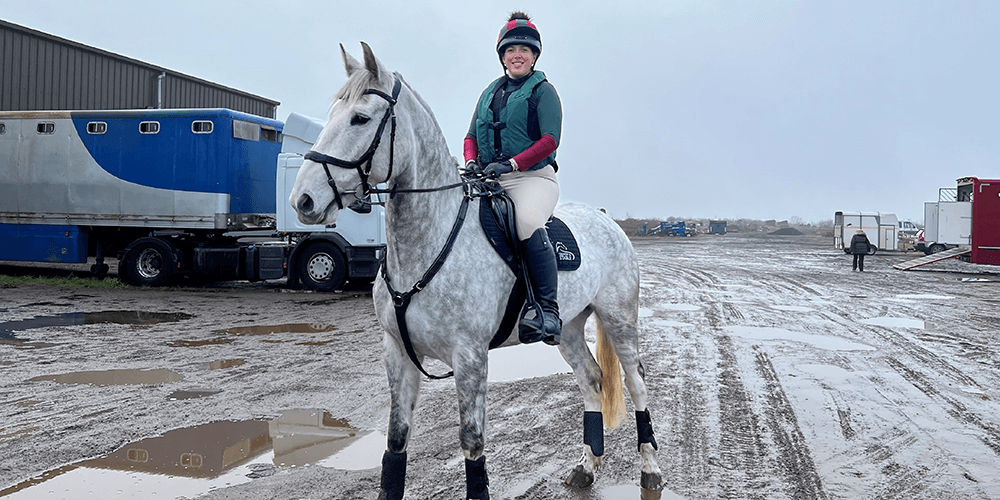
Where to find your horse
Once you’ve scared yourself half to death and you are ready to get cracking, these are good places to look for horses.
- Word of mouth, put a call out to your vet & farrier, think how many hundreds of horses they see each year.
- Check out the horse selling websites.
- Pop a wanted advert out on social media channels
- Join Facebook equestrian groups
After you found a selection of potential horses to look at, my top tip would be: Detail – try and do some extra research on the horse! Sellers cannot hide from social media these days and with so many equestrians completing event reports you are bound to find further information out via such channels. Always check to see if the horse has an affiliated record, do not take the owners word for it. Facebook has some great groups to search dealers out on etc, to ensure they are reputable. Request videos and images before you go to view to ensure you like how the horse moves, this will save your time and also the buyers if your first impressions are negative. I always phone before viewing a horse and explain to the seller what I am looking to do and if the horse would also enjoy that.
Ask about the horse’s history
This is a pretty obvious one. You wouldn’t buy a car or a house without wanting to know about its history, and the same applies for a horse. Find out as much as you possibly can about the horse from the current owner so that there are fewer surprises in the long term and you know what to expect. Need some help on what to ask when buying a horse? Here are a few key questions…
- How long have they had the horse?
- Why are they selling?
- Was there a previous owner? If so, who and why did they sell?
- Any issues with lameness or any other health problems?
- Temperament with other horses
- Has it been in any competitions?
- What is it fed?
- How often is it ridden?
- Any vices?
Again, there are many more questions you can ask when buying a horse, but this is a good starting point.
A pre-purchase examination (PPE) or horse vetting of your horse is also important - a five-stage PPE is needed to insure your horse, so it’s not something you want to skip. They’ll be able to spot issues you can’t, including those that may materialise further down the line. Also, if you require insurance, most insurance companies will require certain level of PPE undertaking before they can offer insurance, e.g., x-rays.
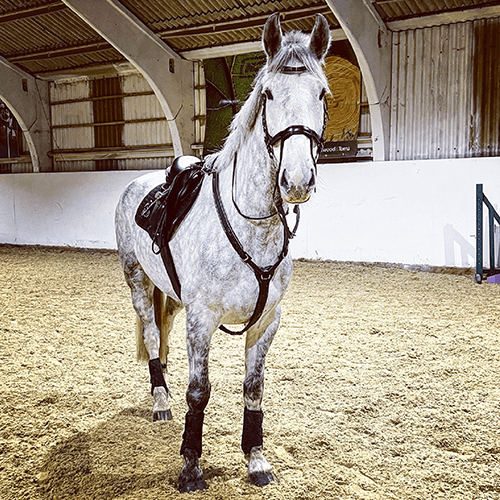
Take an experienced person with you
If possible, always take an experienced horse owner with you when visiting a horse. The reasons for this are pretty obvious - they know what they’re doing and will be able to ask more questions of the current owner, as well as spot anything undesirable that you might miss.
Top Tips when viewing a horse:
- Look at the horses surrounding, stable, field etc.
- How is the horse behaving in their environment.
- Ask to see the horse trotted up, look for any obvious signs of lameness and uncomfortableness.
- Check the limbs and feet to ensure they look clean.
- Take a photo of the horse’s feet, to show your farrier.
Make sure at the viewing you undertake everything you want to do on the horse, e.g., if you need the horse to hack alone, take it down the road on its own. I would also suggest filming the viewing to be able to show to your trainer and so you can view again whilst under no time pressures.
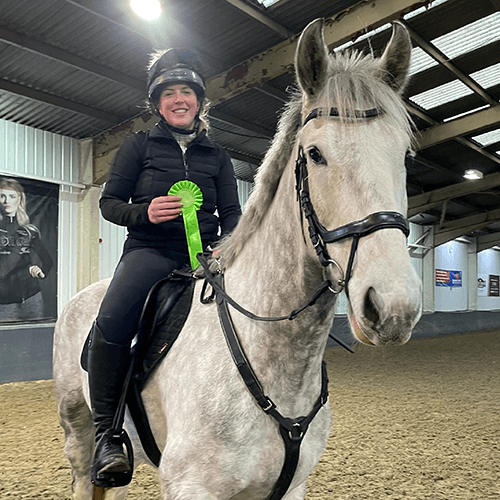
Don’t rush into anything
Buying a horse shouldn’t be a quick process. It should be something you take your time over to ensure you get the right one for you and your family - and also that it’s a good fit for the horse too.
Go and see a few different horses to get more of an idea of what you might be buying and for comparison, as well as the owners who are selling. It’s a big investment, so it’s important you’re happy with your decision. If you have any niggling doubts then it’s probably a sign that this horse isn’t right for you. Don’t simply settle for a horse because you haven’t seen anything better. If it’s not the right horse, walk away.
Do you have any top tips for buying your first horse? Let us know by dropping us a message on Facebook or Instagram.
